-
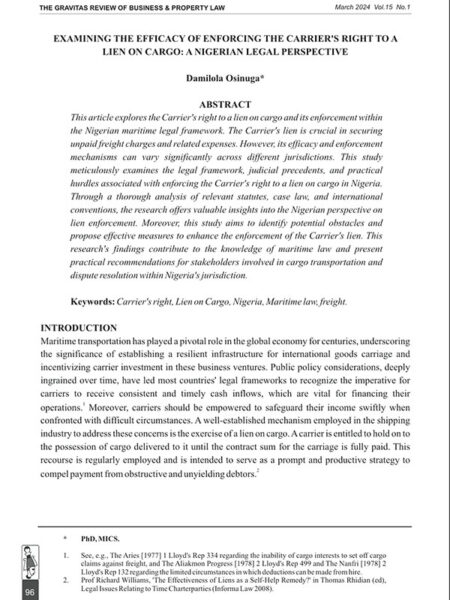
Examining the Efficacy of Enforcing the Carrier’s Right to a Lien on Cargo: A Nigerian Legal Perspective
0₦2,500.00Dr. Damilola Osinuga, in his article, Examining the Efficacy of Enforcing the Carrier’s Right to a Lien on Cargo: A Nigerian Legal Perspective, provides an in-depth exploration of the carrier’s right to a lien on cargo and its enforcement within the Nigerian maritime legal framework. The carrier’s lien plays a crucial role in securing unpaid freight charges and related expenses. However, its efficacy and enforcement mechanisms can vary significantly across different jurisdictions. Osinuga meticulously examines the legal framework, judicial precedents, and practical hurdles associated with enforcing the carrier’s right to a lien on cargo in Nigeria. Through a thorough analysis of relevant statutes, case law, and international conventions, the research offers valuable insights into the Nigerian perspective on lien enforcement. Osinuga aims to identify potential obstacles and propose effective measures to enhance the enforcement of the carrier’s lien.
-

Revisiting MT Eyuwa vs. Inspector General of Police: The Imposition of “Juridical Personality” on a Ship – A Shibboleth?
0₦2,500.00Dr. Osinuga, in his article, Revisiting MT Eyuwa vs. Inspector General of Police: The Imposition of “Juridical Personality” on a Ship – A Shibboleth? revisits the legal concept of ascribing legal personality to a ship in the light of the recent decision of the Nigerian Court of Appeal in MT Eyuwa v Inspector General of Police, that a ship has legal personality. The article suggests that the concept of a vessel’s legal personality may have been misunderstood by the appellate court.
-
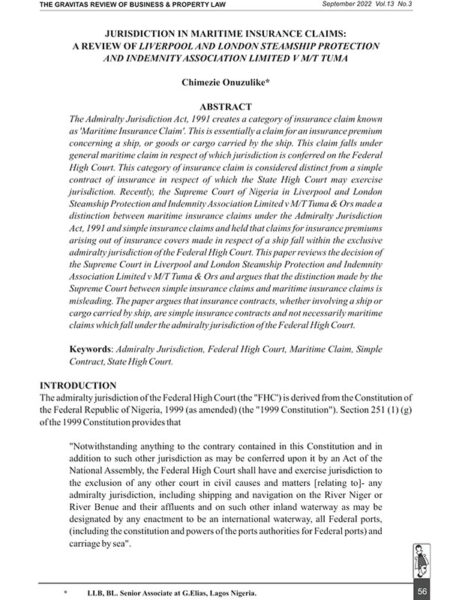
Jurisdiction in Maritime Insurance Claims: A Review of Liverpool and London Steamship Protection and Indemnity Association Limited V M/T Tuma
0₦2,500.00Chimezie Onuzulike, Senior Associate at G. Elias, in his article, Jurisdiction in Maritime Insurance Claims: A Review of Liverpool and London Steamship Protection and Indemnity Association Limited V M/T Tuma, explains that the Admiralty Jurisdiction Act 1991 creates a category of insurance claim known as ‘Maritime Insurance Claim’. This is essentially a claim for an insurance premium concerning a ship, or goods or cargo carried by the ship. This claim falls under general maritime claim in respect of which jurisdiction is conferred on the Federal High Court. This category of insurance claim is considered distinct from a simple contract of insurance in respect of which the State High Court may exercise jurisdiction. Recently, the Supreme Court of Nigeria in Liverpool and London Steamship Protection and Indemnity Association Limited v M/T Tuma made a distinction between maritime insurance claims under the Admiralty Jurisdiction Act 1991 and simple insurance claims and held that claims for insurance premiums arising out of insurance covers made in respect of a ship fall within the exclusive admiralty jurisdiction of the Federal High Court. Chimezie brilliantly reviews the decision of the Supreme Court in that case and argues that the distinction made by the Supreme Court between simple insurance claims and maritime insurance claims is misleading. He argues that insurance contracts, whether involving a ship or cargo carried by a ship, are simple insurance contracts and not necessarily maritime claims which fall under the admiralty jurisdiction of the Federal High Court.
-
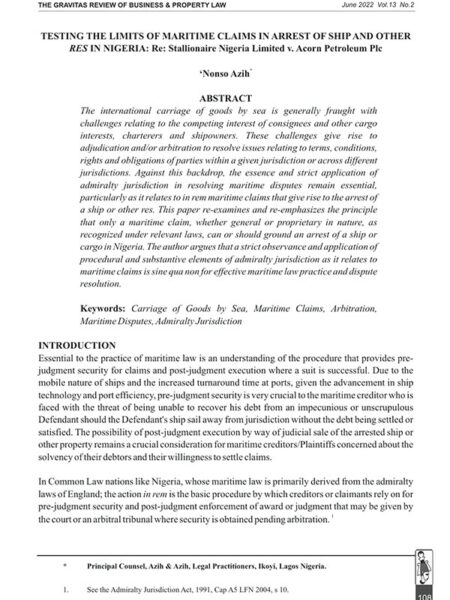
Testing the Limits of Maritime Claims in Arrest of Ship and Other Res in Nigeria: Re: Stallionaire Nigeria Limited v Acorn Petroleum Plc
0₦2,500.00Nonso Azih, Principal Counsel Azih & Azih, in his article, Testing the Limits of Maritime Claims in Arrest of Ship and Other Res in Nigeria: Re: Stallionaire Nigeria Limited v Acorn Petroleum Plc, notes that international carriage of goods by sea is generally fraught with challenges relating to the competing interest of consignees and other cargo interests, charterers and shipowners. These challenges give rise to adjudication or arbitration to resolve issues relating to parties’ terms, conditions, rights, and obligations. The essence and strict application of admiralty jurisdiction in resolving maritime disputes remain essential, particularly as it relates to in rem maritime claims that give rise to the arrest of a ship or other res. Nonso re-examines and re-emphasises the principle that only a maritime claim, whether general or proprietary in nature, as recognised under relevant laws, can or should ground an arrest of a ship or cargo in Nigeria. He argues that a strict observance and application of procedural and substantive elements of admiralty jurisdiction as it relates to maritime claims is sine qua non for effective maritime law practice and dispute resolution.
-
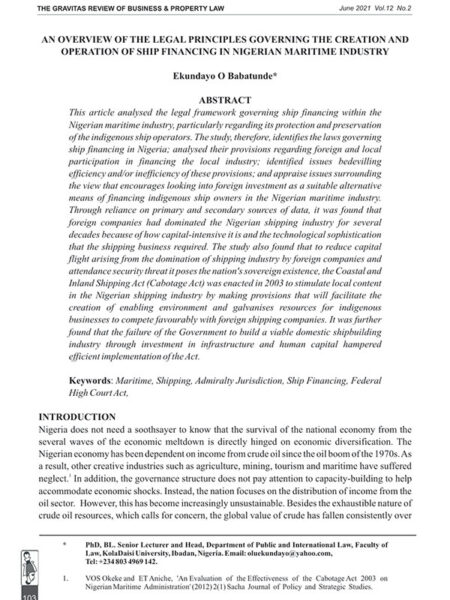
An Overview of the Legal Principles Governing the Creation and Operation of Ship Financing in Nigerian Maritime Industry
0₦2,500.00Dr Ekundayo Babatunde, Senior Lecturer, Faculty of Law, KolaDaisi University Ibadan Nigeria, in his article, An Overview of the Legal Principles Governing the Creation and Operation of Ship Financing in Nigerian Maritime Industry, analyses the legal framework governing ship financing in the Nigerian maritime industry. He considers laws governing ship financing in Nigeria with particular attention to foreign and local participation in the maritime industry. Babatunde explores global best practices on the protection of local maritime industry, Nigeria’s experience with Cabotage and other burning issues in the Nigerian maritime industry.
-
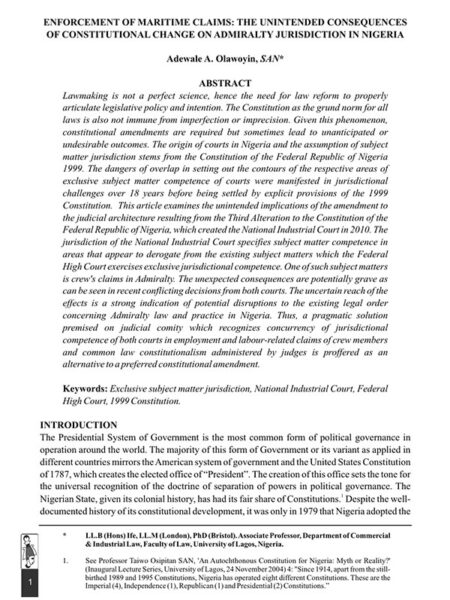
Enforcement of Maritime Claims: The Unintended Consequences of Constitutional Change on Admiralty Jurisdiction in Nigeria
0₦2,500.00Dr Adewale Olawoyin SAN, Associate Professor, Department of Commercial & Industrial Law University of Lagos Nigeria in his article, Enforcement of Maritime Claims: The Unintended Consequences of Constitutional Change on Admiralty Jurisdiction in Nigeria, examines the unintended implications of the Third Alteration to the 1999 Constitution of Nigeria. Section 251 of the 1999 Constitution vests exclusive jurisdiction in admiralty matters in the Federal High Court (FHC). Section 254C (1) of the Constitution (introduced by the Constitution of the Federal Republic of Nigeria (Third Alteration) Act 2010) vests exclusive jurisdiction in all labour and employment matters in the National Industrial Court (NIC). Meanwhile, by the Admiralty Jurisdiction Act(AJA) 1991, the admiralty jurisdiction of the FHC includes maritime claim. Section 2(3)(r) AJA provides that a ‘general maritime claim’ consists of a claim by a master or a member of a ship’s crew for wages or an amount that an employer is obliged to pay his employee. Section 5(3) AJA also provides that ‘maritime lien’ means a lien for wages of the master or of a member of a ship’s crew. Dr Olawoyin SAN considers conflicting decided cases on which Court, FHC or NIC, that would have jurisdiction in claims by the crew of a ship relating to their wages. He proposes legislative and judicial intervention to resolve the legal quagmire.
-
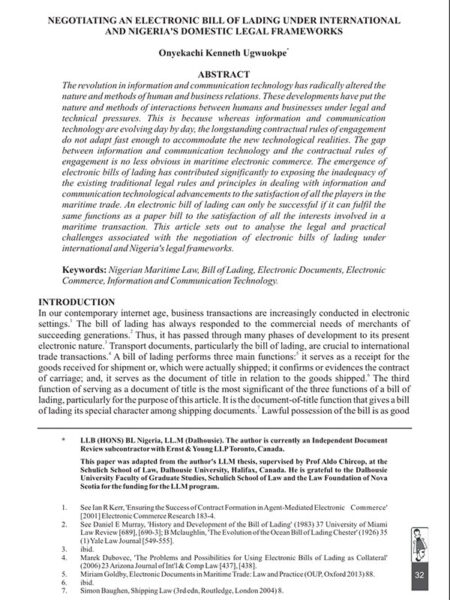
Negotiating an Electronic Bill of Lading under International and Nigeria’s Legal Frameworks
0₦2,500.00Onyekachi Ugwuokpe, Independent Document Review Subcontractor with Ernst & Young LLP Toronto Canada in his article, Negotiating an Electronic Bill of Lading under International and Nigeria’s Domestic Legal Frameworks, notes that although electronic bill of lading in shipping business has great advantages, including savings in time and monetary costs, it has been difficult to replicate the document-of-title function of a bill of lading in an electronic setting. The difficulty for an electronic bill to achieve negotiability arises from the fact that much of the relevant existing legal rules on, and commercial procedures for, negotiating bills of lading are entirely paper-based. The electronic bill of lading is also caught up with the common challenges of electronic documentation, which results from the inability of traditional contract principles to catch up with the rebellious advancements in information and communication technology. Onyekachi masterfully analyses the legal and practical challenges associated with negotiating electronic bills of lading under international and Nigeria’s legal frameworks.
-
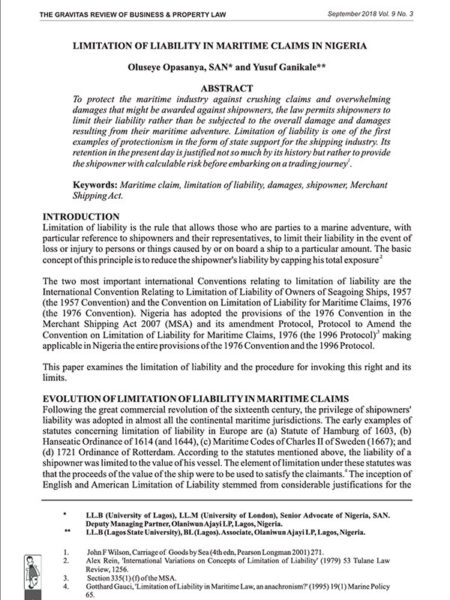
Limitation of Liability in Maritime Claims in Nigeria
0₦2,500.00Oluseye Opasanya SAN, and Yusuf Ganikale, Deputy Managing Partner and Associate respectively at Ajayi LP in their article, Limitation of Liability in Maritime Claims in Nigeria, note that to protect biliathe maritime industry against crushing claims and overwhelming damages that might be awarded against shipowners, the law permits shipowners to limit their liability rather than be subjected to hefty damages resulting from their maritime adventure. They review the provisions of the Merchant Shipping Act 2007 which domesticated the Convention on Limitation of Liability for Maritime Claims, 1976 and its amendment Protocol of 1996, Protocol to Amend the Convention on Limitation of Liability for Maritime Claims, 1976. They distinguish between limitation and liability proceedings, persons who may limit their liability, claims which are subject to limitation, conducts which may defeat limitation and creation of a Limitation Fund.
-
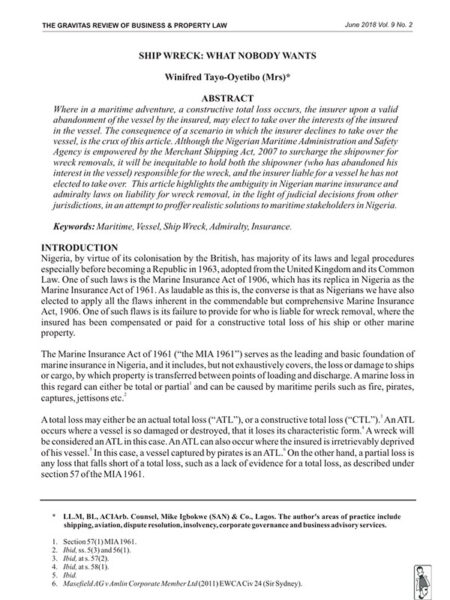
Ship Wreck: What Nobody Wants
0₦2,500.00Winifred Tayo-Oyetibo (Mrs) of Mike Igbokwe (SAN) & Co in her article, Ship Wreck: What Nobody Wants notes that where in a maritime adventure, a constructive total loss occurs, and the insurer having paid the shipowner declines to be saddled with the shipwreck, who then has the responsibility for its evacuation, removal or treatment? Tayo-Oyetibo in a masterly way argues that it will be inequitable to hold the shipowner who has abandoned his interest in the vessel responsible for the wreck, or the insurer who has elected not to take over, liable. She explores the provision of the Marine Insurance Act of 1961 and the 2007 highlighting the ambiguity in the Nigerian laws.
-
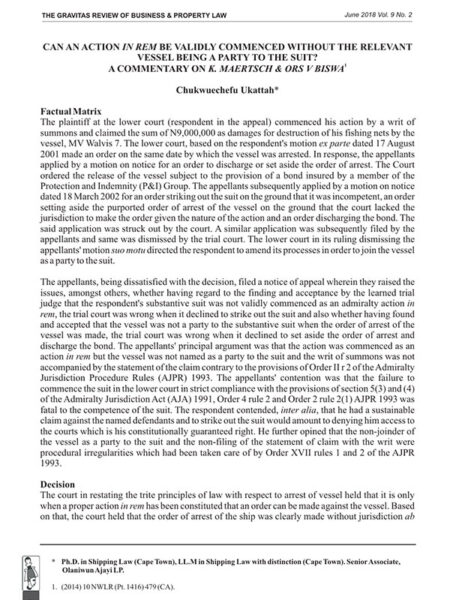
Can an Action In Rem be Validly Commenced Without the Relevant Vessel being A Party to the Suit? A Commentary on K. Maertsch & Ors v Biswa
0₦2,500.00Dr. Chukwuechefu Ukattah, Senior Associate, Olaniwun Ajayi LP asks a pertinent question in: Can an Action in Rem Be Validly Commenced Without The Relevant Vessel Being A Party To The Suit? A Commentary on K. Maertsch & Ors v Biswa. He reviews the decision of the Court of Appeal in the cited case, and using it as a background, explains the different types of admiralty actions and whether a proper action in rem can be constituted without the joinder of the vessel, and whether the non-joinder of the offending vessel in a suit for its arrest, is fatal to the action.
-
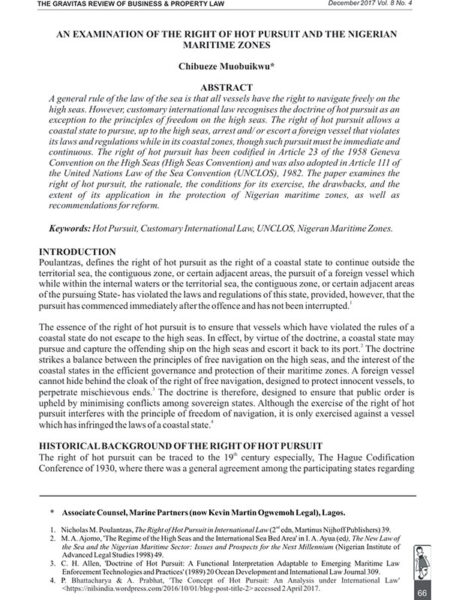
An Examination of the Right of Hot Pursuit and the Nigerian Maritime Zones
0₦2,500.00Chibueze Muobuikwu, Associate, Marine Partners, conducts “An Examination of the Right of Hot Pursuit and the Nigerian Maritime Zones”. He explains that the customary international law right of hot pursuit, allows a coastal state to pursue, up to the high seas, arrest and/or escort a foreign vessel that violates its laws and regulations while in its coastal zones. He notes that the right of hot pursuit has been codified by the Geneva Convention on the High Seas 1958, and adopted by the United Nations Law of the Sea Convention 1982. Chibueze examines the right of hot pursuit, the rationale, the conditions for its exercise, and the drawbacks, and the extent of its application in the protection of Nigerian maritime zones.
-
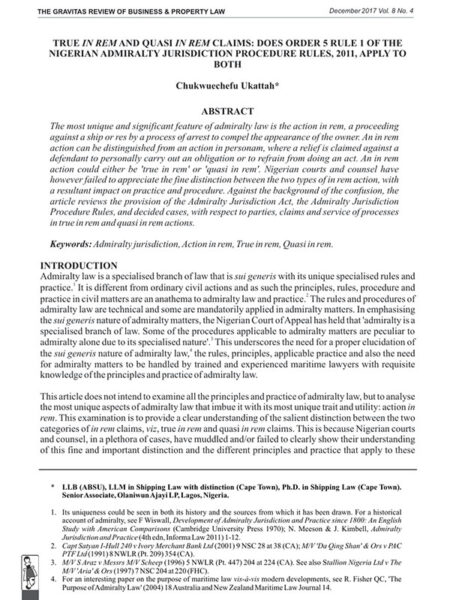
True in Rem and Quasi in Rem Claims: Does Order 5 Rule 1 of the Nigerian Admiralty Jurisdiction Procedure Rules 2011, Apply to Both
0₦2,500.00Dr. Chukwuechefu Ukattah, Senior Associate, Olaniwun Ajayi LP, in his article, “True In Rem and Quasi In Rem Claims: Does Order 5 Rule 1 of the Nigerian Admiralty Jurisdiction Procedure Rules, 2011, Apply to Both?”, notes that an in rem action could either be ‘true in rem’ or ‘quasi in rem’. He argues that Nigerian courts and counsel, have however failed to appreciate the distinction between the two types of in rem action, with a resultant impact on practice and procedure. Against the background of the confusion, he reviews the provision of the Admiralty Jurisdiction Act, the Admiralty Jurisdiction Procedure Rules, and decided cases, with respect to parties, claims and service of processes in true in rem and quasi in rem actions.
The Gravitas Review of Business & Property Law



